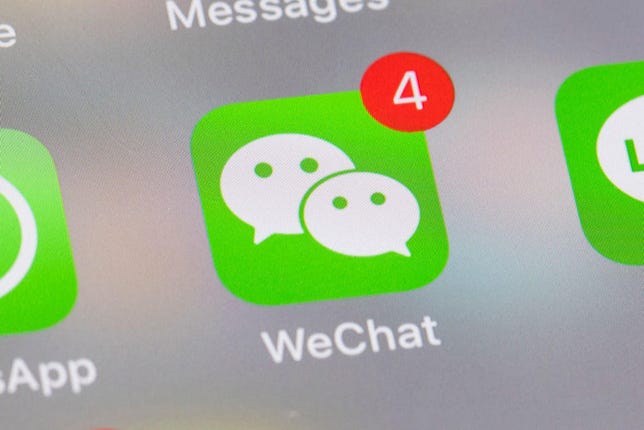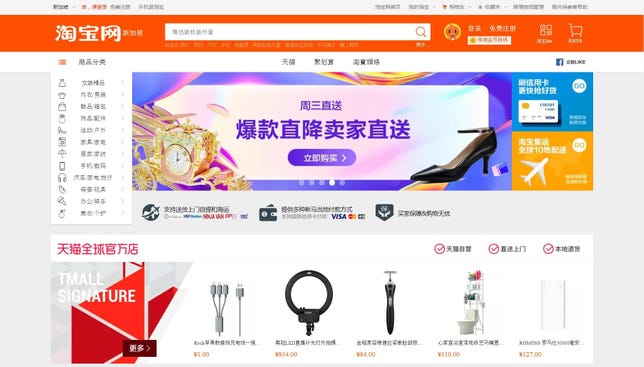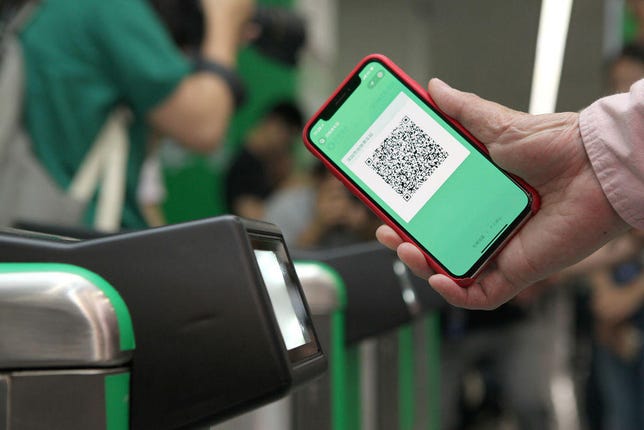Almost a fifth of the world’s population lives in China. But because of the country’s so-called Great Firewall of censorship, its 772 million internet users can’t use the world’s most popular apps — they’re restricted to locally developed versions instead.
Apps by FAANG companies — Facebook, Amazon, Apple, Netflix and Google — either are blocked or feature minimal services in the mainland. Apple, for instance, must remove apps deemed illegal by the ruling party, such as virtual private networks, from its China App Store. It must operate its China iCloud service from within the country, now run by state-owned carrier China Telecom.
On my recent trip to Shenzhen, China’s tech hub, I downloaded several apps to navigate the world and the web. Here’s what I found — consider it a handy guide should you make a trip. And if there’s something you feel we’ve missed, add your thoughts in the comments below.


S3studio/Getty Images
WeChat: A mishmash of Facebook, Instagram and WhatsApp
To chat with friends in China, I use WeChat (or Weixin in China).
The app, which began as a social messaging platform, is the brainchild of Tencent, Asia’s first tech company to be worth $500 billion. Dubbed a “super app,” it lets you chat with your friends, see what they’re doing through the Moments feature (similar to a Facebook wall), make purchases with digital wallet WeChat Pay or play mini games including Jump. It’s a mishmash of Facebook-owned apps — Facebook, Instagram and WhatsApp — and has more than a billion users.
Note: You’ll want to be careful about what you say on WeChat — or any Chinese app for that matter. The state is notorious for its prying eyes, with people landing in jail for what they’ve written in personal chat groups. To stay in the government’s good books, WeChat uses self-censorship, removing posts that are illegal under local regulations.


78-year-old internet celeb Liu Hongwen reads Weibo after the FA Cup Final between Arsenal and Chelsea at home on May 28, 2017, in Beijing.
VCG
Ditch tweets for Weibo posts
Weibo is my favorite place for insight into what people in China think.
The microblogging service is essentially China’s version of Twitter. The topics are mostly China-specific, like local college examinations (gaokao), mass relocations at college dorms, celeb gossip or more serious matters such as the reason satellite Tiangong-1 was retired and China President Xi Jinping’s abolition of the two-term presidential limit.
International talking points hit people’s radars too, including the 2018 World Cup, the Trump-Kim summit, Yanny versus Laurel and an American wearing a Chinese traditional costume to her prom.
Weibo also uses self-censorship (it banned Winnie the Pooh after users compared the tubby bear with the Chinese president), but that hasn’t always protected it from the government’s criticism.


TikTok celebrated its launch in the US at NeueHouse Hollywood on August 1, 2018 in Los Angeles, California.
Joe Scarnici / Getty Images
Boomerang? Douyin’s the way to go
Instagrammers add effects to their posts and stories. But China’s Douyin, known as TikTok outside the mainland, lets you add music and effects to your videos.
Lip syncs, the latest dance crazes and beauty transformation videos make up just some of the addictive content. People are so hooked that despite local authorities’ criticism of lowbrow content, Douyin became the most downloaded iPhone app in the first three months of this year. It has 500 million monthly active users worldwide today.


Internet users in China can access shows from across the world on Youku, not YouTube.
Screengrab by Zoey Chong/CNET
Youku is cooler than YouTube
Before Douyin, there was Youku (“ku” in Chinese means “cool”), commonly seen as China’s version of YouTube — which, by the way, you can’t access in China.
It’s awesome because so much of its content comes with Mandarin Chinese subtitles. That’s how I picked up Cantonese and some Korean. Unlike YouTube, though, ads run for about a minute if you’re a nonmember, so grab your popcorn and a drink before settling down to binge your favorite shows.
Other popular streaming platforms you can check out include Tencent Video and iQiyi, which is a bit like Netflix.
Didi you know Uber was bought out in China?


Zhang Peng/LightRocket via Getty Images
You’re probably used to Ubers prowling the streets and turning up at your doorstep. But that’s not going to work in China.
Didi Chuxing bought the ride-sharing company’s China operation two years ago. And Uber hasn’t quit just China. You won’t find it in Southeast Asia either, so if you’re traveling to that region, get another ride-hailer, such as Grab. (Didi is also available in Australia, Brazil and Mexico.)
Pro tip: Keep the Didi app on your phone. Mine ran out of space during my visit to Shenzhen and I had to get the concierge to call a Didi to my hotel.
Most of Google’s services don’t work. Baidu’s do


Look again. This is Baidu search engine, not Google.
Screengrab by Zoey Chong/CNET
If you’re used to searching Google for recommended restaurants nearby while traveling in a foreign land, I have bad news for you: Just about all Google services won’t work in China.
Yes, that includes Google search, Gmail and Google Maps. A good alternative is Baidu. Its homepage and Maps work in a similar way to Google Maps, letting you look at photos and read reviews of places, or hunt for hotels and good food nearby.
Google still wants to crack China’s digital space: Google Translate, for example, does work in the country — and it’s pretty accurate. The search giant also launched an AI game that lets players draw and guess songs on WeChat.


Score good deals on Taobao, but beware of fakes.
Screengrab by Zoey Chong/CNET
Taobao’s got deals like eBay
If you haven’t heard of Taobao, it’s the online shopping platform owned by Chinese tech behemoth Alibaba. It’s appeared on the US trade representative’s list of markets notorious for counterfeit goods for two years running.
China has long had a problem with fake goods — the Organization for Economic Co-operation and Development said more than half of the world’s counterfeits stem from there — but you can snag tons of good deals from the platform if you know what to look out for. There’s virtually nothing you can’t buy on Taobao, including boyfriends for hire, oil tankers, elf earbuds and bottled fresh air. (That’s not as weird as it sounds — Beijing is notorious for its polluted air.)
Items get a lot cheaper on Singles Day, which falls on Nov. 11 every year. Alibaba popularized this Chinese event as a 24-hour shopping bonanza that dwarfs international equivalents such as Black Friday and Cyber Monday, raking in over $25 billion last year.
More online shopping is available on JD.com, Pinduoduo and Suning, although they’re not free from fakes either.


People are so used to paying for everything with WeChat Pay and Alipay they’re using the digital wallets to pay for their subway rides too.
Zhao Yanxiong/Southern Metropolis Daily/VCG via Getty Images
Pay with AliPay or WeChat Pay
There’s no denying China’s status as a truly mobile-centric nation. Whether it’s ordering a meal or buying groceries, you can get by in China with just your phone. I was worried my Didi driver wouldn’t accept cash payment, but thankfully he did.
Still, be sure to have mobile wallets AliPay and WeChat Pay on your phone. Both wallets command the lion’s share of China’s digital payments economy.
When in China, remember to do as the Chinese do — unless you’re prepared to live without internet access for the length of your stay in the country. So if China’s next on your travel list, make space on your phone and let the downloads begin.
Blockchain Decoded: CNET looks at the tech powering bitcoin — and soon, too, a myriad of services that will change your life.
Follow the Money: This is how digital cash is changing the way we save, shop and work.




